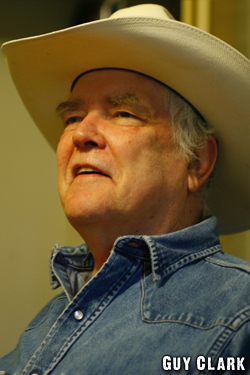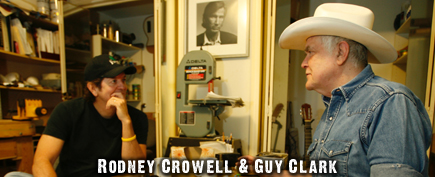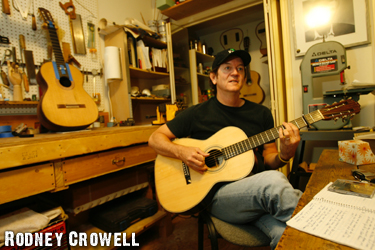
© John Russell / CMA
Townes Van Zandt, who drifted in and out of the scene like a ghost. In the decades since, Crowell and Clark have each found their own kind of success. Crowell flirted with Country stardom in the late '80s before veering to the left to become the consistent hit songwriter and premier Americana artist he is today. And Clark? Well, he's just kept right on being Guy Clark - painting pictures, building world-class guitars , writing songs and releasing albums at his own pace (12 collections of new material throughout the last 31 years).
Guy Clark with Rodney Crowell: Talking Shop
By Peter Cronin
© 2006 CMA Close Up News Service / Country Music Association, Inc.



December 19, 2006
"Sure, I'll do that." - Rodney Crowell
Rodney Crowell didn't hesitate for a second when CMA Close Up approached him about sitting down to interview his old friend Guy Clark. As friends, collaborators and creative rabble-rousers, Crowell and Clark go way back. Both Texas born-and-raised, they've continually shared that indefinable and quirky something that seems to distinguish singer/songwriters from that particular planet. Whatever the reason, the enduring friendship and creative energy between these two musical iconoclasts has constantly been special and still runs deep.
They both hit Nashville in the early '70s, part of a new wave of free-thinking, deep-digging writers following in the formidable wake of Mickey Newbury, Jerry Jeff Walker and especially
His latest album, Workbench Songs, which was released by Dualtone Records on Oct. 17, is a finely distilled collection of story-songs that fit like a favorite sweater. Celebrating the release, Clark gave a series of performances at the Country Music Hall of Fame® as the Museum's 2006 Artist-in-Residence.
The following interview took place in the basement workshop of Clark's Nashville home, with the mingled scents of sawdust and tobacco filling the room and guitars in various stages of disassembly all over the place. Under a well-worn photo of their old friend and inspirer, Van Zandt, the two songwriters settled in for a little shop talk and a lot of laughs.
CROWELL: When you were in your 20s, did you have a workbench?
CLARK: Oh yeah, I always had a workbench. First thing I'd do when I'd rent a garage apartment was find a corner cubby hole and make a workbench; got to have a workbench. I've got this little guitar shop where I make flamenco guitars and then this steel string. In the last five years I've made 10 guitars. But it's something I've always loved to do and I swore I was gonna have a guitar shop so I could just come down and build guitars anytime I wanted to.
CROWELL: As long as I've known you I've never asked you this, where were you born?
CLARK: I was born in Monahans, Texas.
CROWELL: What was your dad doing out there?
CLARK: Well, at that time, in 1941, he was in the Army, and he was in Hawaii for most of the war. My grandmother had a hotel in Monahans. So he grew up there with a single mom. She had her leg amputated on the kitchen table when she was 12. Tough as nails, man.
CROWELL: So your earliest memories would have been wartime?
CLARK: Oh yeah. My dad was overseas, so we lived in this little hotel most of the time. There was a B29 bomber base outside of Monahans in Pyote, Texas. The place was filled with these young pilots either going or coming back, and coming back they were real crazy; you had to be quiet around them, no sudden moves or loud noises.
CROWELL: Was there any music that surrounded wartime radio?
CLARK: Well, yeah, big band, swing stuff.
CROWELL: Was that the first music that you took notice of?
CLARK: Yeah, probably so. That and Louis Armstrong. My parents liked to dance, and at their age the hippest music going was 16-piece dance bands which is really far out. They're all playing these charts and it's just so smokin' man. I remember going to hear a Texas swing band with my parents in some big barn place. I don't know if it was Ernest Tubb, but it was somebody like that in the '40s.
CROWELL: It could have been Bob Wills.
CLARK: Could have been and I just didn't know it. There was never anything but the radio. Nobody had a record player until I got into junior high and bought 45s.
CROWELL: What did you buy?
CLARK: The first thing I bought was a collection of Louis Armstrong records, two songs on each side, the very first 45s. It was like a boxed set. My mother's uncle, who lived in Odessa, ran all the jukeboxes in West Texas, and he had this warehouse full of old 78s that came off of jukeboxes. We were allowed to take armloads of them home. We'd play them and make ashtrays out of them. Probably what was there was really priceless. (laughs)
CROWELL: Your childhood was all in West Texas, right?
CLARK: Not all. I was in the third grade when my father decided to go back to law school on the GI Bill. He had a wife and three kids and we moved to Houston and lived in those old Army barracks on campus while my father went to law school.
CROWELL: You would have been in Houston in the early '50s?
CLARK: Yep. I remember we would take these trips and just drive around Texas. Up in the hill country, down the coast, everywhere just looking for the right small town to set up a law practice.
CROWELL: When did you graduate and what was the world like?
CLARK: 1960. The world was full of hope. John Kennedy was President. The first thing I did was join the Peace Corps.
CROWELL: Did you go off somewhere?
CLARK: No, I got kicked out. (laughs) I spent a month in survival training in Puerto Rico, up in the mountains and then a month at the University of Minnesota at St. Paul studying the Indian language. Man, I spoke Spanish! So why are you sending me to India? (laughs) It was my first confrontation with government bureaucracy. My heart wasn't really in it. Plus, I was having too much fun.
CROWELL: When did you pick up the guitar?
CLARK: Sophomore year in high school. My father had taken in a young woman law partner. She had just graduated from the University of Texas, and her name was Lola Bonner. She sang and played guitar. She was from South Texas and she played all those Mexican songs. It was the first time I'd ever seen anybody sit in a room, just right there. I was absolutely captivated from that moment on. There was just no question I was going to do this. First time I heard her I was like, "Wow, I want to do that."
CROWELL: One little known fact about you is that you were an art director of a teenage dance show, "The Larry Kane Show," which I used to watch as a kid in Texas. I remember seeing Roy Head and the Traits on there and a lot of that good, local stuff. Was there anything you did in school that would give you the background to become an art director for a television show?
CLARK: No, it was something that came very naturally to me.
CROWELL: Besides being a performer and a songwriter, you build guitars, you're a painter, you're an art director. I remember you had that period where you really focused in on painting a lot. The results of your painting were just stunning. You have just a natural gift for the brush stroke.
CLARK: I know, and it just comes so easy to me, it's like, "This isn't fair, it's too easy!" (laughs) That's why I stuck with the guitar. It's like damn, this is hard.
CROWELL: Does building guitars strike you as being as easy as painting?
CLARK: Yep. All my life, we were always encouraged in the arts, in drawing, and just anything crafty. I always did that kind of stuff, and I was always good at it, but I never had any formal training. My first year in college, I majored in physics. (laughs)
CROWELL: That would apply to building guitars.
CLARK: Oh yeah. But it didn't take long to get over that.
CROWELL: I remember you telling me that as a kid you were encouraged to listen to recordings of spoken poetry.
CLARK: When I was growing up, that was pre-TV. We didn't have a TV set until I was a junior in high school. So after supper, we would sit around and either play Scrabble, or Monopoly or read out loud. We'd pass the book around and read poetry out loud, or a novel or a short story or something.
CROWELL: I've said to people, "Besides his imagination and his gift for it, Guy is the best self-editor I've ever known."
CLARK: I like wrangling words. My mother, 'til the day she died, worked the New York Times Crossword Puzzle every day. The use of language was at the top of the list. Some of the poems that we were encouraged to read were really melodic and storytelling, like Robert Service, Vachel Lindsay, Stephen Vincent Benet, just amazing stuff. I still have it.
CROWELL: When did you bump into Townes [Van Zandt]?
CLARK: Probably '64, '65, '66, somewhere around there. I met him with Jerry Jeff [Walker]. Jerry Jeff was hangin' out in Houston, and he brought him to a party one night. That was the first time I saw him.
CROWELL: Had you started writing?
CLARK: No.
CROWELL: But you were performing as a folk singer at the time.
CLARK: Yep. It had to be squeaky clean traditional. The first thing, you had to learn a Bob Dylan song.
CROWELL: It seems to me you would have been ahead of Bob Dylan's songs. You would have been into Leadbelly.
CLARK: Oh yeah, and all that real traditional stuff. In Houston, we had access to Lightnin' Hopkins and Mance Lipscomb. Any time you wanted to go see Lightnin', you could just go see him, you know?
CROWELL: Was Townes the catalyst that triggered you into writing songs?
CLARK: I think so. And Jerry Jeff too, because he was the one who was really doing it. He was out there hitchhiking around, living on the road and making a living playing and singing songs.
CROWELL: He had already written "Mr. Bojangles" probably.
CLARK: At that time is when he wrote it.
CROWELL: So this meeting of you and Jerry Jeff and Townes, that's when you started writing.
CLARK: I said, "If these jerks can do it, I can too." (laughs) There is some of that, but it was also the natural place to go with what I was doing.
CROWELL: With you and Townes and Jerry Jeff, that's three strong alpha males; and all of you in your 20s with that healthy competition and one-ups-manship.
CLARK: It never was competitive, it was always encouraging. The first thing you'd do with a new song was, "Hey, listen to this." The other person isn't going to put it down and tell you it's no good. It wasn't a competitive sport.
CROWELL: Writing is not a competitive sport. But still, in your 20s, there's still that competitiveness. In the case of the Beatles, they wound up hating each other. In terms of Townes and Jerry Jeff, it took a lot of energy to be who they were.
CLARK: Oh yeah. They were real self-centered jerks! (laughs) It was like "me, me, me."
CROWELL: You're a jerk, too. Your jerk always came out in not suffering fools gladly.
CLARK: I guess so.
CROWELL: In the late-'60s you went to California, didn't you?
CLARK: I did. In '68 and '69. I had gotten divorced from my first wife, and went off to find myself, and moved to San Francisco and lived with my friend Minor Wilson. I worked in his guitar shop, and played and sang down in North Beach.
CROWELL: Is that where you started learning how to build guitars?
CLARK: No, that's another thing that just came very naturally to me. The first Mexican guitar I got, the first thing I did was fix it. I started taking it apart and trying to figure out how it worked. And it has fascinated me ever since. It's like, "Wow! What a cool thing!" Especially Spanish-built guitars, just from the craftsmanship point of it.
CROWELL: So, you were in San Francisco in the Summer of Love?
CLARK: I just missed the Summer of Love. The bloom was off the flower children (laughs). After I lived in San Francisco, I moved back to Houston, and that's when Susanna and I got together. We went to L.A. to try to make it in the music business. I was 30 or 31, and it was was like, "Man if you don't do it now, you're gonna die wishing you'd done it." So we packed up all our dishes in our Volkswagen bus. I didn't have any demo tapes, so every time I'd get an appointment with a publisher, I'd take my guitar and some lyrics and sit down and sing for 'em. One day, a guy at Sunbury Music said, "I want somebody to hear you." It was the President of RCA's publishing company, Sunbury/Dunbar. I played four songs, and he said "That's fine, how much money do you want, and where do you want to live?"
CROWELL: And you said "Nashville."
CLARK: I knew already just from living in L.A. a year, that I did not really want to live there. And I knew Mickey [Newbury] lived here.
CROWELL: When people ask me about your work I tell them it's a deep combination of brilliant imagination and melodic sense combined with this incredible jeweler's eye of a self-editor. Revision is the writer's friend.
CLARK: Yeah, it's like that first Mexican guitar I ever got, the first thing I wanted to do with it was fix it. And I just get a kick out of wrangling words, you know? I just enjoy it.
CROWELL: Painting, building guitars and writing songs, does it all come from the same source, the same kind of influence?
CLARK: Sure, I think so.
CROWELL: So what about the future, is there anything you haven't done that you'd like to do?
CLARK: Yeah. All these things that you're talking about, the painting, the writing and building guitars, are things that I do that no one ever gets to be the best there is at. And the more you do it the less you know, and the harder it is the better. I've always wanted to build a house, but it's always, "I don't think so right now." And I've always wanted to build a boat, but "I don't think so right now." And I still want to build another one of these guitars over here.
CROWELL: But if you wanted to build a house, I bet you'd build yourself a good one.
CLARK: Yeah, I would!
Rodney Crowell interviews Guy Clark. Photo: John Russell / CMA
© John Russell / CMA